Ever since Jeff Bezos scraped the edge of space in his Blue Origin space shuttle and Elon Musk declared that he was going to colonize Mars, India’s curiosity towards space & Astro tourism in India has skyrocketed. But what is Astro tourism and where can we find it in India? Let’s find out!
If you’re wondering what Astro-tourism is, what it feels like…the below-written personal recollection might serve you as a taste of things to come.
During pandemic lockdowns, I was in Bangalore with my family. Boxed within our four walls with nowhere to go, we used to talk a lot about space, aliens, and conspiracy theories. We used to stand on the balcony, keep looking up and gaze at the stars, wondering if anyone was out there and about our place in this Universe. They are some of my fondest family memories that also expanded my perception. I never thought that isolating yourself from the world will open your mind to a whole new world.

What is Astro tourism?
Astro tourism is an umbrella term that covers space travel, deep space exploration, astrophotography, stargazing, and observing celestial objects. In addition to going to planetariums, space observatories, observing the night sky with/without a telescope to study the movement of stars, planets, and other celestial bodies comes under the facets of Astro tourism.
It is considered to be carbon-neutral tourism because, in order to experience a clear night sky, the sky must be pollution-free and must provide a crystal clear view of the heavens above.
Why Astro Tourism? Why now?
Our civilization is at a stage where humans are leaning towards intellectual satisfaction with an aim to explore the obscure psychological, educational, and aesthetic dimensions of a human body-mind-soul complex. While being confined to our homely boundaries, the lockdowns taught us that we were giving away too much importance to social, materialistic satisfaction. Slowly, it helped us to turn our energy towards other facets of this life that previously went unnoticed.
How much will you shop from the same brands? How long will you ‘chill’ in lounges and clubs? Satisfied with seeing the same beachscape? There comes a time when a mind wants to wander, alone in unexplored territories and Astro-tourism, a carbon-neutral tourism mode, provides that same thing.
What do you need for a successful terrestrial Astro tourism experience in India?
- A clear night sky
I stay in Bangalore and believe me, I understand how rare it is to see a clear night sky. Even if you do, there is so much light & dust pollution that you will be lucky to catch a glimpse of a constellation, let alone the milky way. So first things first, leave the cityscape towards the suburbs. The outskirts where the village lands start appearing and there are fewer cars and lights.

- Telescope
There are many Astro tourism places in India where you need to wait till nightfall and then look up with your naked eyes. But for the more curious ones, a telescope will do wonders. Many observers have even found new stars, planets, and celestial objects while casually telescoping the night sky. You don’t know what you may find!
This telescope found extraterrestrial visitors in space! Read about ‘Oumuamua’, the first interstellar visitors that graced our solar system.
Top 5 Astro Tourism Places in India
1. Jantar Mantar, Rajasthan
The perfect example of Astro tourism Jaipur is the Jantar Mantar, an ancient astronomical site (also a UNESCO World Heritage Site) built by the founder of Jaipur, King Sawai Jai Singh II. Once there, you will find a collection of 19 fixed astronomical instruments wherein you can actually observe the night sky in detail.
2. Hanle, Ladakh
Any mention of Astro tourism in India is undoubtedly incomplete without mentioning Ladakh. To promote Astro-tourism in Ladakh, the Ladakh administration coupled with the India Institute of Astrophysics declared the village of Hanle as a dark sky sanctuary. In fact, this means that Hanle is now a hub of carbon-neutral tourism that would allow tourists unrestricted access to a clean night-sky experience.
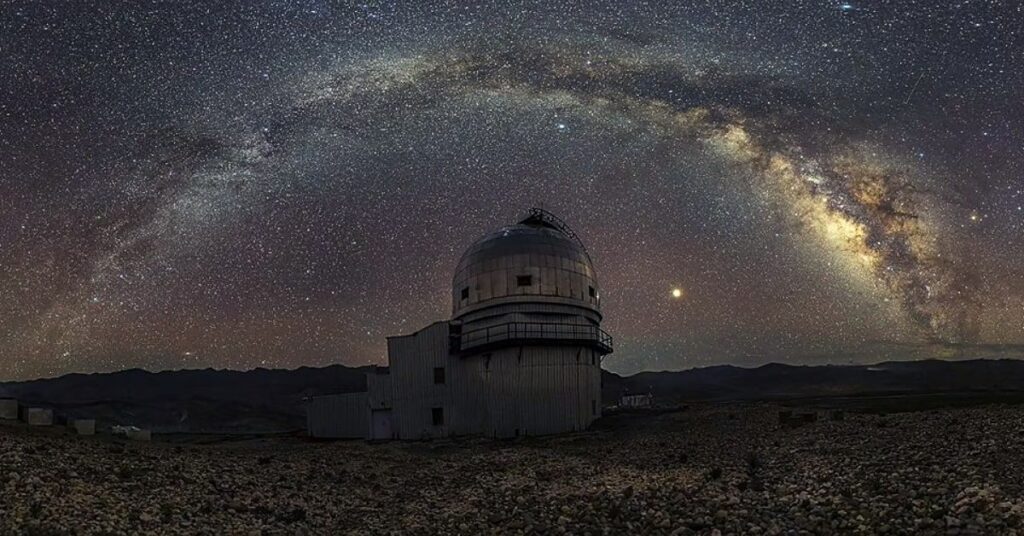
Havens for astrophotography aficionados in Ladakh: Panging lake, Nubra Valley
3. Rann of Kutch, Gujarat
It is the largest salt marsh in the world. One of the few places in India whose sky remains pollution-free. The expansive white sands give a gorgeous view of the night sky. Likewise, you can observe various celestial bodies, stars, etc.
Feeling lucky in Kutch? You may even see a Chir Bhatti, a mysterious phenomenon that only happens in Kutch. If you like astrophotography, you can become the first one to capture them in the lens!
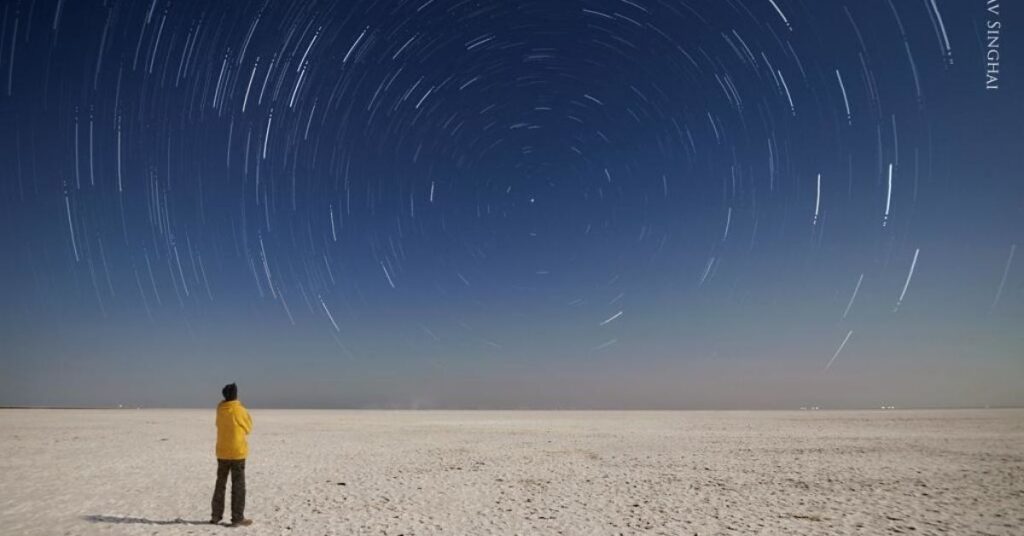
4. Coorg, Karnataka
Between October & March, Coorg offers the perfect night sky to gaze into. The scenic beauty, as well as the sprawling coffee estates and naturally pressed oil mills. With miles and miles of an unblemished starry sky.
5. Taregna, Bihar
Crowned by NASA as the best place to watch a Solar Eclipse, Taregna is the place where Aryabhatta studied the movement of stars. While the name is phonetically similar to ‘Taare Ginna’ which translates to ‘counting stars’. Taregna is one of the lesser-known Astro tourism places in India but when you look at its history, it makes up for one of the most important Astro-tourism spots in India.
Are you a true Astronomy nerd? Check this out: https://indiachalk.com/blog/5-reasons-to-explore-indias-first-ever-astronomy-resort/
Bonus terrestrial Astro tourism spot outside India: The Georgia Guidestones.
Located in Georgia USA, these slabs of stone have a set of ten guidelines. Engraved upon them in eight different languages including Hindi. It functions as a compass, clock & calendar.
After seeing many powerful people focussing on space exploration, lunar travel, and Mars colonization. As far as Astro tourism in India is concerned, all I can say is that there is no doubt that we will all soon be looking up towards the night sky a lot more than ever before.
Terrestrial Astro tourism is the first step towards the next step in our evolution. Will we ever find what we are looking for or will stumble upon something we didn’t even know? The answer to this question, in any manner, will be terrific.
Follow India Chalk on Instagram for more amazing travel content. You can share your travel story with us. Reach out to us on email at contact[at]ndiachalk[dot]com. This blog is curated by India Chalk and written by Aishwarya Dikshit.


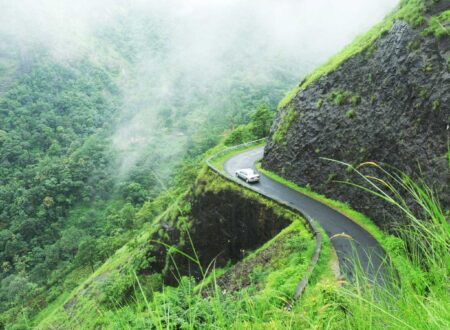
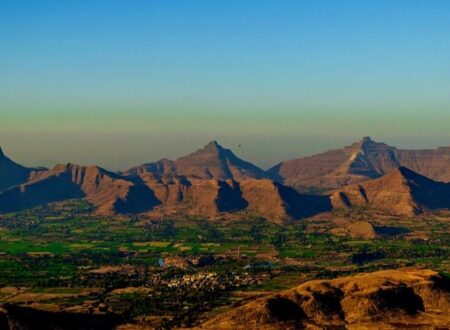
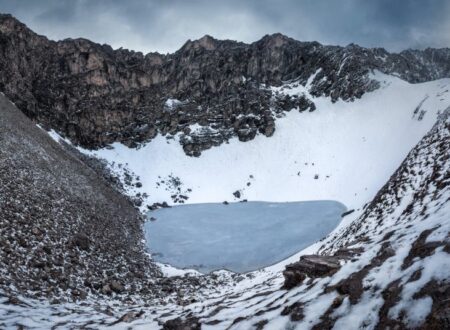

2 Comments